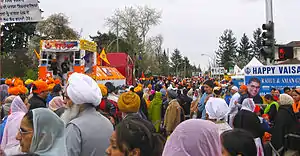Vaisakhi
Vaisakhi (Punjabi: ਵਿਸਾਖੀ, (also known as Baisakhi) is an important festival celebrated by Panjabis. It is a very big celebration in South Asia and is celebrated around April 13.

Observance
Vaisakhi is the ancient harvest festival in the Punjab region. It is also the start of a new solar year, and new harvest season. Baisakhi is a Sikh religious festival.[1] It falls on the first day of the Baisakh month in the Nanakshahi calendar and Panjabi calendar, which corresponds to April 13 in the Gregorian calendar. In Sikhism, it remembers the creation of the Khalsa at Anandpur Sahib in 1699, by the 10th Sikh Guru, Guru Gobind Singh.[2]
This day is also observed as the beginning of the Hindu solar new year celebrated by the people of Nepal and India in Assam Valley, Kerala, Orissa, West Bengal and some other regions of India. There are regional variation outside of Punjab too. In Himachal Pradesh, the Hindu Goddess Jwalamukhi is worshipped on Vaisakhi, while in Bihar, the Sun-god Surya is honoured.[3]
Other observances
The festival is celebrated as
- Rongali Bihu in Assam,
- Naba Barsha or Pohela Boishakh in Bengal and Tripura, *Puthandu (Tamil New Year) in Tamil Nadu,
- Vishu (or Vaishakhi) in Kerala,
- Bikhu or Bikhauti in the Kumaon region of Uttarakhand,
- Maha Vishuba Sankranti (or Pana Sankranti) in Orissa, and the
- Sinhalese New Year festival in Sri Lanka.
Calendars
Hinduism and Sikhism have several religious calendars. Some places of worship accept one version and others use a different version. So the festival will always fall on the same day in the western Gregorian calendar.
References
- "Sikhism holy days: Baisakhi". BBC. Retrieved 2007-07-08.
- "The Historic Day of Baisakhi". Brig. Partap Singh Ji Jaspal (Retd.). Archived from the original on 2009-01-29. Retrieved 2009-03-08.
- "hinduism info". BBC. Retrieved 2008-02-12.